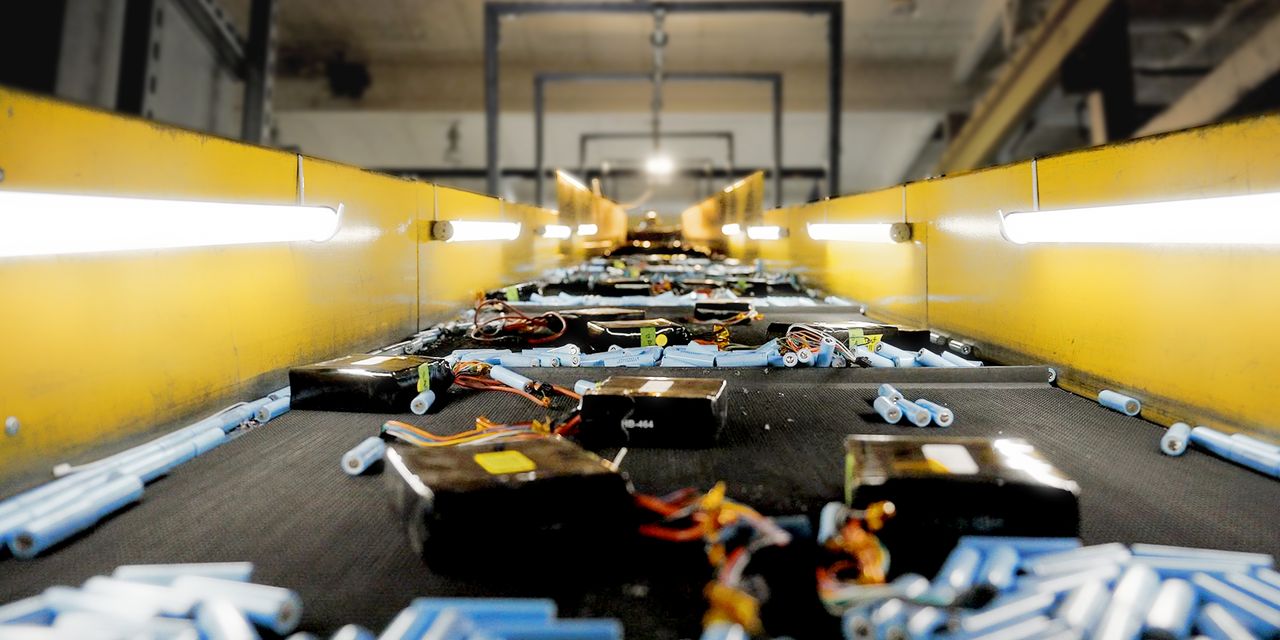The race has begun to supply the hundreds of millions of batteries it will take to power the electric-vehicle revolution.
Most of that effort depends on mining materials like lithium, cobalt, and nickel. But recycling will be a huge part of the battery supply, too, and a newly public company has a head start.
Li-Cycle Holdings
(ticker: LICY), a Canadian company based in Toronto, is already one of the leading recyclers of lithium-ion batteries.
It went public by merging with a special-purpose acquisition company, or SPAC, and started trading last month. Li-Cycle opened at $11.70 on Aug. 11, the day after the merger, and mostly traded lower until this week, when multiple analysts weighed in with positive reviews.
Li-Cycle isn’t yet profitable and may not be for at least two years, so analysts tend to value it on projected sales.
This year, sales are likely to be just $12 million. But Li-Cycle is projecting that sales will increase to $958 million in 2025 as the company opens several facilities throughout the U.S. That ramp-up won’t really start bearing fruit until 2023 or 2024.
Using a multiple of 3.5 times his estimate for 2024 sales—in line with other fast-growing electric-vehicle-related names—Wedbush Securities analyst Daniel Ives comes up with a price target of $14 a share, or nearly 30% above the recent price. He thinks the company is “in the sweet spot of a pending green tidal wave.”
| Key Data | |
|---|---|
| Headquarters: | Toronto, Canada |
| Recent Price: | $10.94 |
| YTD Change: | 5.6% |
| Market Value (bil): | $1.7 |
| 2022E Sales (mil): | $45.4 |
| 2022E Net Income (mil): | -$25.6 |
| 2022E EPS: | -$0.14 |
| 2022E P/E: | N/A |
| Dividend Yield: | None |
Note: Estimates for fiscal 2022 ending in October. E=estimate. N/A=not applicable.
Source: FactSet
Electric vehicles make up just 5% of global auto sales today, and 3% in the U.S., but the next few years could see parabolic growth.
President Joe Biden has set a goal for half of U.S. vehicle sales to be electric by 2030. Sales of lithium-ion batteries now total $41 billion annually, but are projected to grow to $115 billion by 2030, Ives notes. And the battery-recycling industry could grow from $2.7 billion to $7.5 billion by 2027, he estimates.
Li-Cycle was founded in 2016 by two engineers who had worked on lithium at the Canadian company Hatch. In an interview, co-founder Ajay Kochhar says they were unimpressed with current methods of recycling, which largely involve burning off unneeded materials and using heat to separate chemicals. At least half of the valuable material in a battery can be wasted in the process, Kochhar says.
They decided to “start from a clean sheet” and invent their own process. The result is a patent-protected method that depends more on chemical treatment than burning and causes much lower emissions. Up to 95% of the valuable material is saved, Kochhar added.
The company’s cost of materials is much lower than competitors, and considerably below the cost of mining them, too, Ives writes.
Li-Cycle’s automated process for sorting recycled materials allows it to recycle all sorts of battery-powered items. About half of the material that Li-Cycle recycled in 2020 came from consumer electronics, but its biggest growth area is electric vehicles.
The company has already signed deals with major battery-component makers. One of those is with Ultium Cells, a joint venture between
General Motors
(GM) and
LG Chem
(051910.South Korea).
It has also signed a deal to send all of the chemicals it produces at a facility being built in Rochester, N.Y., to privately held metals-trading company Traxys.
As of earlier this year, the value of the materials it is expected to sell to Traxys was $300 million a year, notes Morgan Stanley.
Li-Cycle is building a network of spokes and hubs across the country to extract key materials near suppliers’ manufacturing facilities. Li-Cycle’s facilities can now process 10,000 tons of material a year, or enough to create the material to power an estimated 20,000 electric vehicles.
Morgan Stanley analyst Adam Jonas estimates that Li-Cycle has a 30% market share in North America, based on the amount of material it recycles.
The company also intends to expand overseas, where the market opportunity is even larger than in the U.S.
One factor that may be holding back the stock is that it will take time for battery recycling to ramp up. If Li-Cycle investors had to wait until old electric vehicles are sent to dumps for scrap, that would mean it could take a decade for profits to materialize. But Li-Cycle is already capitalizing on the industry’s growth.
For one thing, at least 5% to 10% of battery material is discarded in the process of building batteries, and Li-Cycle has deals to take that material and extract the key components.
It’s one reason that Ken Geren, chief investment officer of UBS O’Connor’s Environmental Focus Strategies, a hedge fund, owns the stock.
“I think the market assumes that there’s really no material earnings exposure until car batteries are recycled, which is maybe 10 years out in scale,” Geren says. “I think what’s misunderstood is that through the manufacturing process, which is growing rapidly today, their volumes will increase tremendously.”
Electric-vehicle companies may also have to scrap batteries for other reasons. A GM recall involving the lithium-ion batteries in the Chevrolet Bolt, for instance, affects more than 140,000 vehicles.
Kochhar says he couldn’t discuss whether Li-Cycle is involved in recycling any of those batteries.
Just a few years ago, potential investors would tell Kochhar that he was launching too early, because this market wouldn’t exist for a decade.
Today, the industry is advancing at a pace that surprises even him.
“And we’re just getting started, right?” he says. “That’s the exciting thing.”
Write to Avi Salzman at avi.salzman@barrons.com
[ad_2]
Source

